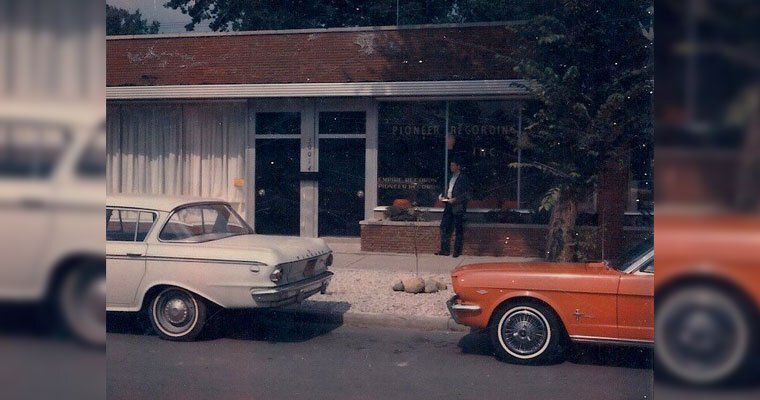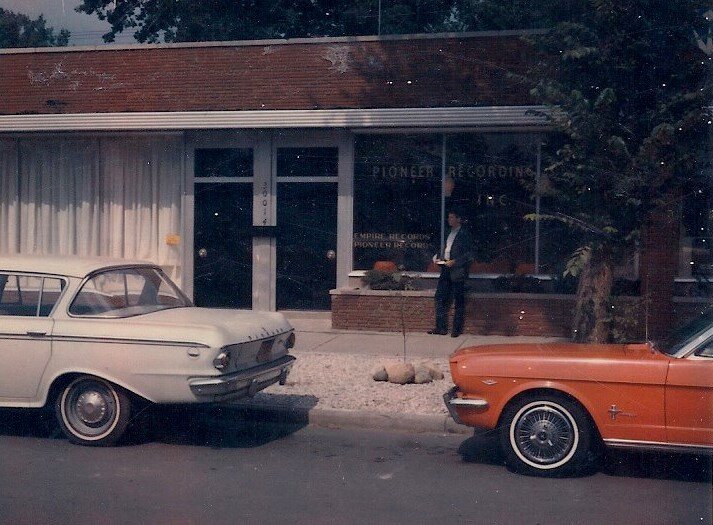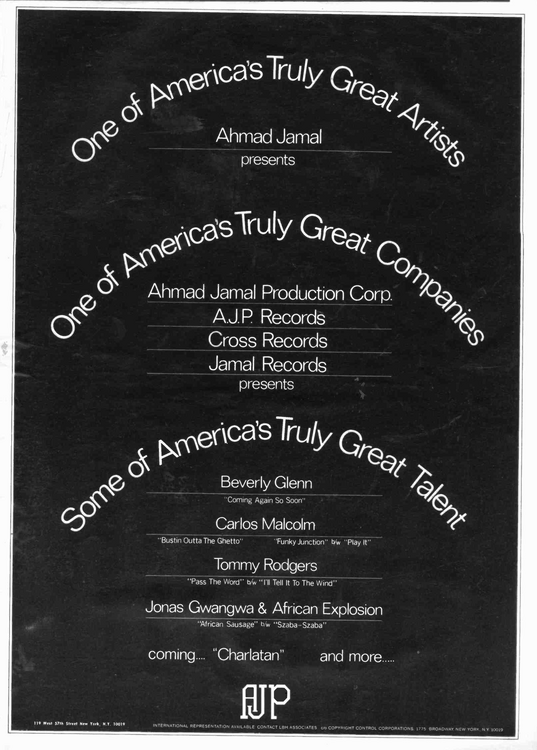MD Records - The Musical Journey of Tommy Rodgers
'great pleasure to unveil two more releases from the Pioneer Vaults'

MD Records are thrilled to continue our musical journey by returning to Detroit and collaborating with Gary Rubin of Pioneer studio fame. Building upon the success of the immensely popular Alfreda Brockington release, we are excited to delve into the rich musical landscape of Detroit once again.
This studio has solidified its reputation as one of the best under-the-radar gems waiting to be discovered. It has produced a treasure trove of previously unknown tracks, including hidden gems from The Tomangoes. In fact, we still have one track under wraps. Additionally, Pioneer studio brought us the sensational sounds of The Sensations, an unknown band that delivered a captivating northern soul dancer with "Blinded by Pride." The studio also served as the creative hub for esteemed artists such as The Gambrells, Jock Mitchell, Tommy Rodgers, Jonnie Mae Mathews, James Lately, Cody Black and many more.
Now, it gives us great pleasure to unveil two more releases from the Pioneer Vaults. Tommy Rodgers is a name familiar to many for his own talents, along with his association with the Brewster Crew, among others. Each release features a never-before-released A-side, accompanied by alternative, unreleased recordings of previously released tracks. As always, these recordings have been remastered from the original studio tapes by the renowned JJ at Goldenmastering, ensuring that they are revitalised for today's vinyl production methods.
To uncover the intriguing story behind Tommy Rodgers' musical journey, our very own, Jordan Wilson, embarked on an exploration of Tommy's life, diligently documenting his conversations with the artist and his family.
Born as Thomas Gilbert Rodgers, known affectionately as Tommy Rodgers, on December 6th, 1942, he spent his early years residing at 2232 St Joseph Street, near the iconic Brewster-Douglass housing projects. The 1950 census includes Tommy, living with his mother Catherine, sisters Joyce, Betty, Venida, and his younger brother Frank (nicknamed Frankie). Growing up in Detroit, Tommy's family had relocated from Georgia as part of the first great migration (1910-1940), seeking better opportunities in northern and midwestern cities like New York, Chicago, and Detroit.
During the 1930s, the Brewster-Douglass Housing Projects were established to accommodate the influx of people moving to Detroit. This affordable housing became a vibrant hub of musical talent, where singers harmonised on street corners and musicians jammed day and night. Notably, this gave rise to legendary figures such as Diana Ross, Mary Wilson, and Florence Ballard of The Supremes, who would go on to dominate the music world with Berry Gordy and their iconic Motown sound.
Tommy embarked on his educational journey at Cass Technical High School in Detroit, graduating in 1962. It was there that he met his teenage sweetheart, Diana Ross. In her book, "Secrets of a Sparrow," Ross fondly recalls their shared moments, stating, "I had a boyfriend named Tommy Rodgers, who lived just across the street, and he used to walk me to school. Tommy was a really good singer, and we sang a lot together."
.png.da7316ea3129eb29bfd7ebccc6cb39b5.png)
Tommy Rodgers (School Photograph)
In 1961, when Otis Williams was forming a group to audition for the Gordy label, Tommy received an invitation to join the lineup. However, he had to decline due to his draft into the Vietnam War. The group would later become The Temptations, achieving tremendous success worldwide. It's intriguing to consider how Tommy's path might have differed had circumstances been different.
In 1965, as Pioneer Studio expanded, Gary Rubin relocated it to 20014 James Couzens, Detroit. The studio gained attention when Ken Barnard from the Detroit Free Press wrote an article titled "One Lad's Bid to Hit It Big Like Motown." The article announced open auditions at Pioneer Studio, offering aspiring musicians the chance to be signed to either Pioneer or Empire Records.

Pioneer Exterior Shot - Notice Window; Empire Records / Pioneer Records
Throughout the mid-1960s to the mid-1970s, Pioneer Recording Studio provided a haven for both professionals and amateurs. Known for its affordability compared to high-tech studios like United Sound or Tera Shirma, Pioneer became the go-to studio in Detroit. Gary Rubin's auditions yielded a wealth of talent, with notable signings including The Gambrells, The New Loves, The Moniques, and The Tomangoes. Unfortunately, many of these tracks remained unheard and unreleased until MD Records took on the task of sharing them with the world.
Why were these tracks left unreleased? The events unfolding in Detroit during that time offer an explanation. In 1967, the Detroit Riot erupted, becoming the largest riot the country had seen since the New York draft riots in 1863. The city was engulfed in chaos, with looters, arsonists, and civilian snipers wreaking havoc. The Vietnam War compounded the challenges faced by Pioneer Studio, as drafted members of groups and artists would often disappear, hindering promotions and live appearances at local venues.
Meanwhile, in New York, Ahmad Jamal, a talented pianist and composer, established AJP Records in 1969. One of his trusted associates, James "Jimmy" Shaw, had connections in Detroit and played a crucial role as the director of A&R for Rock and Gospel, reporting directly to Ahmad Jamal. Shaw's previous work with Golden World Productions and his association with trombone player Don R. White, a member of Motown's Funk Brothers, kept him in the loop regarding promising talent in Detroit.
On October 2nd, 1969, Tommy Rodgers completed the mixes for his five songs at Pioneer Studio. Among the tapes were "Summer Love," "Tell It to The Wind," "United Hearts of America," "Give Me Freedom (Or Give Me Love)," and "Pass the Word." AJP Records announced in Billboard magazine on October 11th, 1969, that "Sing It to The Wind" and "Pass the Word" would be released. This left "Summer Love," "United Hearts of America," and "Give Me Freedom (Or Give Me Love)" in the vault, waiting for their time to shine.
Tommy Rodgers' recordings at Pioneer Studio marked the debut for AJP Records, launching the label that would go on to release albums. Notably, Tommy's younger sibling Frankie Rodgers co-wrote "Pass the Word."
Billboard Magazine Poster
Following the disappointment of the unsuccessful AJP releases, Tommy and Frankie found themselves back in the grind of everyday life. However, in 1974, Tommy Rodgers made a comeback to the vibrant Detroit music scene. This time, he formed a group called "The Brewster Crew," paying homage to his upbringing near the Brewster Housing Projects. Teaming up with Doris Williams and James Nyx Jr, Tommy wrote and produced two tracks for The Brewster Crew to record: "Outta My Life" and "I'm One Who Know." These exceptional tracks were released twice on Lifeline Records, becoming the only known songs to emerge from The Brewster Crew. It is worth noting that while Tommy has shared the existence of unreleased backing tracks, sadly, no vocals were ever overdubbed onto them.
We extend a heartfelt thank you to Tommy, his sister Venida, and Frankie Rodgers for their invaluable contribution in bringing this remarkable story to light. To experience the magic of Tommy's previously unreleased tracks, we invite you to visit our YouTube Channel, where you can listen to them in all their glory.
You can place your order through the following links for immediate shipping!
'Give Me Your Freedom' / 'I'll Sing To The Wind' - Link to Order
'United Hearts of America' / 'Pass The Word' - Link to Order
Listen here:



Recommended Comments